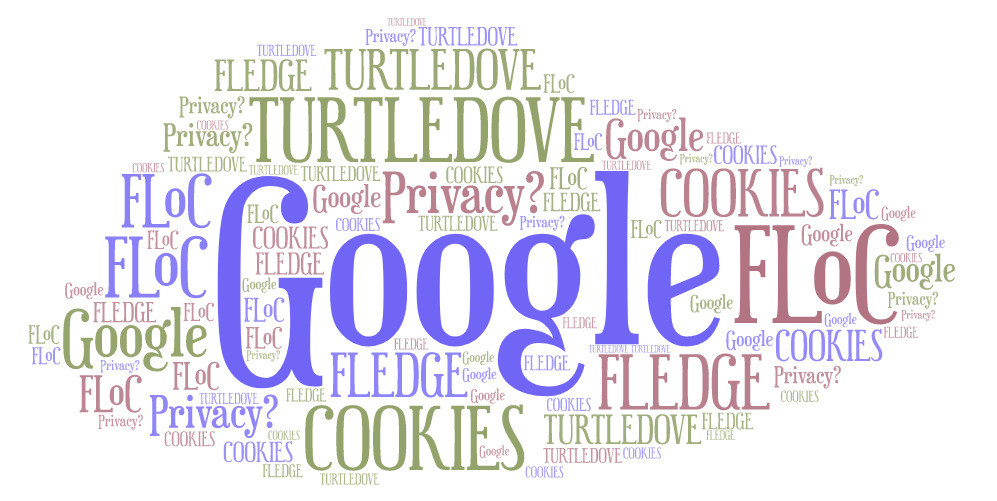The Whole World will Still be Watching You: Google & Digital Marketing Industry “Death-of-the-Cookie” Privacy Initiatives Require Scrutiny from Public Policymakers

The Whole World will Still be Watching You:
Google & Digital Marketing Industry “Death-of-the-Cookie” Privacy Initiatives Require Scrutiny from Public Policymakers
Jeff Chester
One would think, in listening to the language used by Google, Facebook, and other ad and data companies to discuss the construction and future of privacy protection, that they are playing some kind of word game. We hear terms (link is external) such as “TURTLEDOVE,” “FLEDGE,” SPARROW and “FLoC.” Such claims should be viewed with skepticism, however. Although some reports make it appear that Google and its online marketing compatriots propose to reduce data gathering and tracking, we believe that their primary goal is still focused on perfecting the vast surveillance system they’ve well-established.
A major data marketing industry effort is now underway to eliminate—or diminish—the role of the tracking software known as “third-party” cookies. Cookies were developed (link is external) in the very earliest days of the commercial “World Wide Web,” and have served as the foundational digital tether connecting us to a sprawling and sophisticated data-mining complex. Through cookies—and later mobile device IDs and other “persistent” identifiers—Google, Facebook, Amazon, Coca-Cola and practically everyone else have been able to surveil and target us—and our communities. Tracking cookies have literally helped engineer a “sweet spot (link is external)” for online marketers, enabling them to embed spies into our web browsers, which help them understand our digital behaviors and activities and then take action based on that knowledge. Some of these trackers—placed and used by a myriad (link is external) of data marketing companies on various websites—are referred to as “third-party” cookies, to distinguish them from what online marketers claim, with a straight face, are more acceptable forms of tracking software—known as “first-party” cookies. According to the tortured online advertiser explanation, “first-party” trackers are placed by websites on which you have affirmatively given permission to be tracked while you are on that site. These “we-have-your-permission-to-use” first-party cookies would increasingly become the foundation for advances in digital tracking and targeting.
Please raise your hand if you believe you have informed Google or Amazon, to cite the two most egregious examples, that they can surveil what you do via these first-party cookies, including engaging in an analysis of your actions, background, interests and more. What the online ad business has developed behind its digital curtain—such as various ways to trigger your response, measure your emotions (link is external), knit together information on device (link is external) use, and employ machine learning (link is external) to predict your behaviors (just to name a few of the methods currently in use)—has played a fundamental role in personal data gathering. Yet these and other practices—which have an enormous impact on privacy, autonomy, fairness, and so many other aspects of our lives—will not be affected by the “death-of-the-cookie” transition currently underway. On the contrary, we believe that a case to be made that the opposite is true. Rather than strengthening data safeguards, we are seeing unaccountable platforms such as Google actually becoming more dominant, as so-called “privacy preserving (link is external)” systems actually enable enhanced data profiling.
In a moment, we will briefly discuss some of the leading online marketing industry work underway to redefine privacy. But the motivation for this post is to sound the alarm that we should not—once again—allow powerful commercial interests to determine the evolving structure of our online lives. The digital data industry has no serious track record of protecting the public. Indeed, it was the failure of regulators to rein in this industry over the years that led to the current crisis. In the process, the growth of hate speech, the explosion of disinformation, and the highly concentrated control over online communications and commerce—to name only a few— now pose serious challenges to the fate of democracies worldwide. Google, Facebook and the others should never be relied on to defer their principal pursuit of monetization out of respect to any democratic ideal—let alone consumer protection and privacy.
One clue to the likely end result of the current industry effort is to see how they frame it. It isn’t about democracy, the end of commercial surveillance, or strengthening human rights. It’s about how best to preserve what they call the “Open Internet.” (link is external)Some leading data marketers believe we have all consented to a trade-off, that in exchange for “free” content we’ve agreed to a pact enabling them to eavesdrop on everything we do—and then make all that information available to anyone who can pay for it—primarily advertisers. Despite its rhetoric about curbing tracking cookies, the online marketing business intends to continue to colonize our devices and monitor our online experiences.
This debate, then, is really about who can decide—and under what terms—the fate of the Internet’s architecture, including how it operationalizes privacy—at least in the U.S. It illustrates questions that deserve a better answer than the “industry-knows-best” approach we have allowed for far. That’s why we call on the Biden Administration, the Federal Trade Commission (FTC) and the Congress to investigate these proposed new approaches for data use, and ensure that the result is truly privacy protective, supporting democratic governance and incorporating mechanisms of oversight and accountability.
Here’s a brief review (link is external) of some of the key developments, which illustrate the digital “tug-of-war” ensuing over the several industry proposals involving cookies and tracking. In 2019, Google announced (link is external) that it would end the role of what’s known as “third-party cookies.” Google has created a “privacy sandbox (link is external)” where it has researched various methods it claims will protect privacy, especially for people who rely on its Chrome browser. It is exploring “ways in which a browser can group together people with similar browsing habits, so that ad tech companies can observe the habits of large groups instead of the activity of individuals. Ad targeting could then be partly based on what group the person falls into.” This is its “Federated Learning of Cohorts (FLoC) approach, where people are placed into “clusters” based on the use of “machine learning algorithms” that analyze the data generated from the sites a person visited and their content. Google says these clusters would “each represent thousands of people,” and that the “input features” used to generate the targeting algorithm, such as our “web history,” would be stored on our browsers. There would be other techniques deployed, to add “noise” to the data sets and engage in various “anonymization methods” so that the exposure of a person’s individual information is limited.
Its TURTLEDOVE initiative is designed to enable more personalized targeting, where web browsers will be used to help ensure our data is available for the real-time auctions that sell us to advertisers. The theory is that by allowing the data to remain within our devices, as well using clusters of people for targeting, our privacy is protected. But the goal of the process— to have sufficient data and effective digital marketing techniques—is still at the heart of this process. Google recently (link is external) reported that “FLoC can provide an effective replacement signal for third-party cookies. Our tests of FLoC to reach in-market and affinity Google Audiences show that advertisers can expect to see at least 95% of the conversions per dollar spent when compared to cookie-based advertising.” Google’s 2019 announcement caused an uproar in the digital marketing business. It was also perceived (correctly, in my view) as a Google power grab. Google operates basically as a “Walled Garden (link is external)” and has so much data that it doesn’t really need third-party data cookies to hone in on its targets.
The potential “death of the cookie” ignited a number of initiatives from the Interactive (link is external) Advertising Bureau, as well as competitors (link is external) and major advertisers, who feared that Google’s plan would undermine their lucrative business model. They include such groups as the Partnership for Addressable Media (PRAM), (link is external) whose 400 members include Mastercard, Comcast/NBCU, P&G, the Association of National Advertisers, IAB and other ad and data companies. PRAM issued a request (link is external) to review proposals (link is external) that would ensure the data marketing industry continues to thrive, but could be less reliant on third-party cookies. Leading online marketing company Trade Desk is playing a key role here. It submitted (link is external) its “United ID 2.0 (link is external),” plan to PRAM, saying that it “represents an alternative to third party cookies that improves consumer transparency, privacy and control, while preserving the value exchange of relevant advertising across channels and devices.” There are also a number of other ways now being offered that claim both to protect privacy yet take advantage of our identity (link is external), such as various collaborative (link is external) data-sharing efforts.
The Internet standards groups Worldwide Web Consortium (W3C) has created (link is external) a sort of neutral meeting ground where the industry can discuss proposals and potentially seek some sort of unified approach. The rationale for the [get ready for this statement] “Improving Web Advertising Business Group goal is to provide monetization opportunities that support the open web while balancing the needs of publishers and the advertisers that fund them, even when their interests do not align, with improvements to protect people from the individual and societal impacts of tracking content consumption over time.” Its participants (link is external) are another “Who’s Who” in data-driven marketing, including Google, AT&T, Verizon, NYT, IAB, Apple, Group M, Axel Springer, Facebook, Amazon, Washington Post, Verizon, and Criteo. DuckDuckGo is also a member (and both Google and Facebook have multiple representatives in this group). The sole NGO listed as a member is the Center for Democracy and Technology.
W3Cs ad business group has a number of documents (link is external) about the digital marketing business that illustrate why the issue of the future of privacy and data collection and targeting should be a public—and not just data industry—concern. In an explainer (link is external) on digital advertising, they make the paradigm so many are working to defend very clear:
Marketing’s goal can be boiled down to the “5 Rights”:
-
Right Message to the
-
Right Person at the
-
Right Time in the
-
Right Channel and for the
-
Right Reason.
Achieving this goal in the context of traditional marketing (print, live television, billboards, et al) is impossible. In digital realm, however, not only can marketers achieve this goal, they can prove it happened. This proof is what enables marketing activities to continue, and is important for modern marketers to justify their advertising dollars, which ultimately finance the publishers sponsoring the underlying content being monetized.”
Nothing I’ve read says it better. Through a quarter century of work to perfect harvesting our identity for profit, the digital ad industry has created a formidable complex of data clouds (link is external), real-time ad auctions, cross-device tracking tools and advertising techniques (link is external) that further commodify our lives, shred our privacy, and transform the Internet into a hall of mirrors that can amplify our fears and splinter democratic norms.
It’s people, of course, who decide how the Internet operates—especially those from companies such as Google, Facebook, Amazon, and those working for trade groups as the IAB. We must not let them decide how cookies may or may not be used or what new data standard should be adopted by the most powerful corporate interests on the planet to profit from our “identity.” It’s time for action by the FTC and Congress.
Part 1.
(1)For the uninitiated, TURTLEDOVE stands for “Two Uncorrelated Requests, Then Locally-Executed Decision On Victory”; FLEDGE is short for “First Locally-Executed Decision over Groups Experiment”; SPARROW is “Secure Private Advertising Remotely Run On Webserver”; and FLoC is “Federated Learning of Cohorts”).
(2) In January 2021, the UK’s Competition and Markets Authority (CMA) opened up an investigation (link is external) into Google privacy sandbox and cookie plans.

